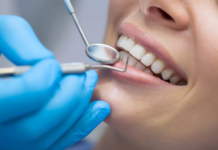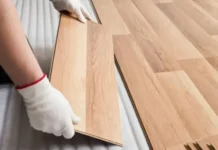How to clean hard water deposits? Many homeowners have been suffering from this problem. Fortunately, the solutions are more simple than you may think.
You can eliminate the deposits by using cleansers, such as vinegar, baking soda, tartar cream, or even your toothpaste.
Otherwise, you can avoid the problem by investing in a softener system or the best kitchen faucet for hard water.
This article will give you step-by-step instructions. Let’s read on to discover!
What Is Hard Water?
Hard water is water with high dissolved magnesium and/or calcium concentration. People also use manganese and other minerals to measure the hardness.
Although this liquid is crystal clear, it can turn hard due to the high content of some minerals. The denser the content, the harder the liquid gets.
Water is an all-purpose solvent. Hence, it can pick up and dissolve most of the contaminants it contacts.
The liquid collects tiny amounts of those minerals as it travels through the soil and continues to absorb them until the concentration is high enough to give it a “hardness.”
As a result, the water has a terrible smell and may cause havoc on your appliances, pipes, and personal hygiene.
1. The deposits cause a lot of problems (Link)
How Do You Know If You Have Hard Water?
You can’t tell if your water has turned hard just based on its appearance. In most cases, the effect on your water-using devices will tell as well as your hair and skin. Here are a few indicators that you may be suffering from this problem.
Strange taste or odor
You may notice a metallic, dirt-like, or salty taste and fishy odor. This unpleasant taste and odor can add an odd character to your drinks and tea.
Stubborn stains
The minerals will accumulate around the fixtures, bathtub, sink, and even on your dishes, and these deposits discolor your appliances. What’s worse, they may clog your water heater as the deposits damage the heating elements.
Irritated skin
After having a shower, you may have detected a chalky, white coating on your skin. In this case, you can blame the soap scum.
The hardness elements interact with the soap, leaving a soapy deposit on your skin. This film then covers your pores, making skin moisturizing harder.
Dry hair
You may be suffering from the deposits if your hair becomes dingy or dry, although you are using high-quality shampoo and hair conditioner.
Dull clothes
If minerals react with your laundry detergent, the outcome can be unpleasant. This mixture produces a powdered layer that might damage your clothing, towels, and bedding.
2. You can easily notice the problem caused by the deposits (Link)
Removing Hard Water Deposits From A Faucet Head
You don’t have to buy any special cleansing products. Some familiar ingredients can help you solve this problem.
Vinegar
Vinegar is a non-toxic, organic cleaner that works beautifully on stains. Here’s how to put it to use:
-
Pour vinegar in a sprayer and spray it on the dirty faucet head.
-
Allow the vinegar to dissolve the minerals for 5 to 15 minutes.
-
If the vinegar dries up, respray it to keep the faucet damp.
-
Brush the faucet once it has soaked long enough.
Baking soda
Ceramic stains must be irritating. Minerals form a deposit on even the most costly faucet, making them look terrible.
To fix the problem with baking soda, follow these steps:
-
Prepare a mixture of water and baking soda.
-
Apply the mixture to the faucet.
-
Allow several minutes for this cleanser to absorb the stains.
-
Scrub gently with a brush.
Hydrogen peroxide
Hydrogen peroxide can deal well with stubborn stains. Here is what to do to cleanse the affected area:
-
Apply a paste made from tartar cream (a form of baking powder) to the stained faucet head.
-
Let it rest for about 30 minutes.
-
Scrub the surface using a damp sponge.
Fluoride toothpaste
Fluoride toothpaste can protect and keep your teeth clean. It can also work well at removing stains from the deposits.
The paste is the best for handling small glass surfaces and metal fixtures. You can also use it on dishes.
Just apply the paste on the stains, and scrub them with a brush until the surface turns back to its previous appearance.
3. Your faucet will look clean with cheap cleaners (Link)
Softener system
You’ll need to buy a softener to get rid of this problem. This system eliminates particles from tap water before it passes through your pipelines.
Thanks to the filtering system, the softener can avoid stains and preserve the aesthetics of the faucet.
This system also helps avoid frequent problems from the mineral deposits, such as poor heater performance, lifeless hair, dirty clothes, or irritated skin.
Conclusion
Hard water stains are real headaches for every homeowner. Thankfully, you can apply many methods to eliminate stains. The cleaners for each are also cheap.
Hopefully, you will find this article helpful. For any further information, please feel free to ask. Thank you for reading!



































































